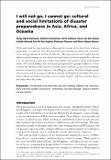| dc.contributor.author | I will not go, I cannot go: cultural and social limitations of disaster preparedness in Asia, Africa, | |
| dc.date.accessioned | 2022-02-07T09:33:53Z | |
| dc.date.available | 2022-02-07T09:33:53Z | |
| dc.date.issued | 2019 | |
| dc.identifier.uri | https://repository.maseno.ac.ke/handle/123456789/4894 | |
| dc.description.abstract | While much work has been invested in addressing the economic and technical basis of disaster
preparedness, less effort has been directed towards understanding the cultural and social obstacles to and opportunities for disaster risk reduction. This paper presents local insights from five
different national settings into the cultural and social contexts of disaster preparedness. In most
cases, an early warning system was in place, but it failed to alert people to diverse environmental
shocks. The research findings show that despite geographical and typological differences in these
locations, the limitations of the systems were fairly similar. In Kenya, people received warnings,
but from contradictory systems, whereas in the Philippines and on the island of Saipan, people
did not understand the messages or take them seriously. In Bangladesh and Nepal, however, a
deeper cultural and religious reasoning serves to explain disasters, and how to prevent them or
find safety when they strike. | en_US |
| dc.subject | : cultural and social attitudes, decision-making, disaster risk reduction, early warning system, evacuation, immobility, loss and damage, religious beliefs, risk perception | en_US |
| dc.title | I will not go, I cannot go: cultural and social limitations of disaster preparedness in Asia, Africa, and Oceania | en_US |
| dc.type | Article | en_US |

